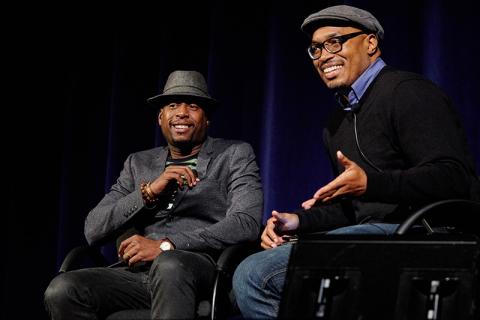Hip-Hop Hero Talib Kweli Drops Knowledge on Berklee

Talib Kweli (left) with Brian "Raydar" Ellis
Photo by Dave Green
At the eighth annual Business of Hip-Hop/Urban Music Symposium, acclaimed rapper Talib Kweli offered advice to the upcoming generation of hip-hop hopefuls. While Kweli has established a vast catalogue over the course of the past two decades, he is best known for his work as one-half of the hip-hop duo Black Star, alongside the artist formerly known as Mos Def and now known as Yasiin Bey. Kweli has also collaborated with artists such as Mary J. Blige, Kendrick Lamar, and Kanye West, and his lyric writing skills have received high praise from Jay-Z, who gave Kweli this shout-out on the track “Moment of Clarity” from The Black Album: “If skills sold, truth be told, I’d probably be, lyrically, Talib Kweli.”
Following a mood-setting hip-hop set from Berklee’s J Dilla Ensemble, Kweli was interviewed by Berklee Ensemble Department instructor Brian “Raydar” Ellis, who many know from his collaborations with artists such as Robert Glasper, Cee-Lo Green, and Yasiin Bey. The following is an edited and abridged selection from the conversation.
Brian “Raydar” Ellis: “Can you please speak a little bit about how Brooklyn, where you’re from, has influenced you?”
Talib Kweli: “Brooklyn and New York City in general has had as much influence on me as the upbringing from my parents. That’s what has birthed my music. It’s a huge part of my stories, the way I see the world, and what I rhyme about.”
BE: You’ve been on an indie label, a major label, and you’ve gone super-independent with your own imprint. What are some of the differences you’ve experienced?
TK: “It’s about being fluid. I released my last album a year ago straight to fans on my website with no middleman, but now I’m putting it on iTunes today. The whole thing was I wanted to get email addresses to connect with fans. As a matter of fact, I’ve got a song on my new album with Robert Glasper and Bilal and there’s a poem that a fan sent me that’s part of the song. That’s one of the perks to having that kind of relationship. However, because iTunes is such a behemoth, far more people will know about the album when it’s on iTunes. So I gave it to fans and got a year’s worth of emails, and now I’m going to give it to the rest of the world.”
BE: “Can you offer some insight into the “do’s” and “don’ts” of the sample-clearing process?”
TK: “The main thing that I’ve learned is to do that during the recording process, because the mistake that I’ve made is that if you only focus on being creative, creative, creative, you can end up spending a year and a half or two years after you’re done trying to get people to sign off on paperwork, and that kills the freshness of the project. As soon as a song comes in I want to sample, I’m trying to clear it immediately.”
BE: Let’s say there’s a student who just graduated with a band and a million dollars in loans. They moved to New York City, L.A., or Nashville and they get part-time jobs. What are three things this band needs to do to get to the next level in their career?
TK: “Some artists are smart enough to be their own business managers and all that, but most aren’t, including me. You need a good manager who’s going to put you first, be your fan, and fight for you but also push back and not be a ‘yes man.’ You need a good business manager—someone that can keep your money flowing right and tight. You need a good booking agent—someone who’s going to recognize which venues you’ll be good at, which bills you can be a part of, and which artists you’ll align with. And now that I’ve finally found a good lawyer, I see the value of having a good lawyer. I say you need this team, but that’s when you’re doing it professionally. Until that money’s coming in, your team is whomever you’re there with. That’s your team.”
BE: “You recently wrote a response article to an article that [Stefan] Schumacher wrote about Lauryn Hill. You wrote something to the effect of, ‘Just because you are paying to see her, she doesn’t necessarily have to do songs from certain records the way that you want them to be done.’”
TK: “We’ve become so entitled to art that we compare it to a slice of pizza or something like that. I had a discussion on Twitter with a lady who said, ‘If I pay a plumber to come to my house and do a service, and that plumber does a bad job, then I reserve the right [to get my money back].’ And I said, ‘Well, she’s not a [expletive deleted] plumber.’ I said an artist is different than a plumber. She got upset and said, ‘You’re an elitist if you say an artist is better than a plumber.’ But I never said ‘better;’ I said ‘different.’ It’s not smart or prudent for an artist to do [things that will stop people from coming to their shows], however that doesn’t change the fact that the artist has every right to do so. Those things can be inconvenient, annoying, or disturbing to us as fans, but it doesn’t make them less of an artist—and in some cases, it makes them more of an artist.”